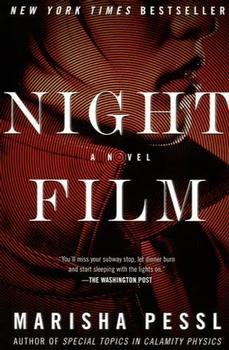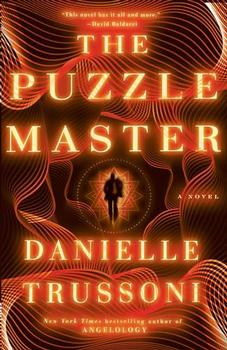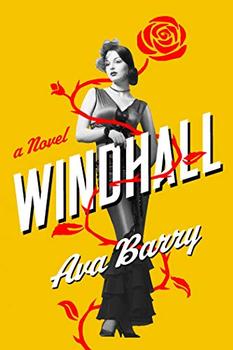Summary | Excerpt | Reading Guide | Reviews | Beyond the book | Read-Alikes | Genres & Themes | Author Bio

One of the central tenets of Hinduism states that the world as we know it is just an illusion – this concept is referred to as "Maya." The theory is the basis for quite a few stories including the much-acclaimed science fiction film, The Matrix. It is also the driver for Night Film, a book that will have you questioning the illusory nature of truth as you go on a wild rollercoaster ride in Marisha Pessl's able hands.
Stanislas Cordova, a famed director of horror films, is a cult legend despite stepping out of the limelight 30 years ago; so when his 24 year-old daughter, Ashley, turns up dead in a Manhattan warehouse from what is an apparent suicide, reporter Scott McGrath's curiosity is piqued. Five years ago, while investigating her father, McGrath's career spun out of control, a fact he can't help but blame on the enigmatic and elusive Stan Cordova. Finding out the truth behind Ashley's death, McGrath is convinced, will give him a chance at redemption - one that he readily jumps at. Thus begins a long chase to uncover the truth - one that will test every reserve that McGrath possesses and wring him dry.
Night Film is not without its flaws. For one thing, it could use some editing. Then, there is this plot point that strains credulity: early on, McGrath is joined by two questionable helpers - a young woman and a man. Their motivation to set off on this immensely risky journey with McGrath seems so far-fetched and sketchy that it is a major negative in what is otherwise a well-crafted novel. One would have expected an author of Pessl's caliber to think this plot point (on which a large section of the novel rests) through more thoroughly. In fact it jars so much, that it took me a while to get back into the book and move along.
As you keep reading however, Pessl's beautiful, haunting imagery and vivid writing completely pull you in and you emerge breathless. She makes you lose sight of the trees for the forest - the eerily creepy forest. Already famous for her literary pyrotechnics with her debut, Special Topics in Calamity Physics, Pessl showcases her immense talent again. Her metaphors alone are a thing of joy. "Long after my wife had divorced me, swimming on to bluer seas, a dense school of her girlfriends swirled around me as if I were an interesting shipwreck, looking for a piece of rubble to salvage and take home." Pessl's painting of creepy abandoned estates, of early morning walks, of brushing against bare branches, is immensely cinematic and enough to make you just a bit creeped out. Witchcraft, devil worship, black magic - practically every dark element is explored here. And just as she did in Calamity Physics, Pessl uses visual aids including photos and newspaper clips to supplement her story-telling in arresting ways. The result is an exhilarating journey, a worthy follow-up to her engaging debut.
"The man had a penchant for working with reality - manipulating his actors, pushing them to the brink. Now he's done it with me," McGrath says of Stan Cordova in the end. And Pessl, with her remarkable talent, does the same thing to us, her readers. As you chase clue after clue, each successive "answer" has you question the previous one and reevaluate your assumptions about what is right. You are drawn deeper and deeper into the abyss from which there is no escape. In the end, you realize you have been "taken" and it is to Pessl's immense credit that you don't even care. Readers expecting neat resolutions or a classic whodunit might be disappointed. Pessl's agenda here is not to craft a true-to-form thriller with neat compartmentalized answers served straight up on the rocks. Instead she has us explore the nature of fear; delve into our own inner terrors. Eventually she has you believe in the version of the "truth" that you hold closest to your comprehended reality. The concept of "Maya" looms large here.
With Night Film, Pessl proves she is no one-hit wonder. "The family's favorite tale was Rumplestiltskin. That's what they did, what they were, fantastical creatures spinning the ordinary, dreary straw around them into gold," says a professor of the Cordovas. That characteristic might well apply to Marisha Pessl as well. After all, she creates brilliant stories with ordinary words; she too spins "dreary straw" into pure gold.
![]() This review was originally published in The BookBrowse Review in August 2013, and has been updated for the
July 2014 edition.
Click here to go to this issue.
This review was originally published in The BookBrowse Review in August 2013, and has been updated for the
July 2014 edition.
Click here to go to this issue.

If you liked Night Film, try these:

by Danielle Trussoni
Published 2024
Reality and the supernatural collide when an expert puzzle maker is thrust into an ancient mystery—one with explosive consequences for the fate of humanity—in this suspenseful thriller from the New York Times bestselling author of Angelology

by Ava Barry
Published 2022
A stunning literary thriller in which an investigative journalist in modern Los Angeles attempts to solve the Golden Age murder of a Hollywood starlet.
Your guide toexceptional books
BookBrowse seeks out and recommends the best in contemporary fiction and nonfiction—books that not only engage and entertain but also deepen our understanding of ourselves and the world around us.